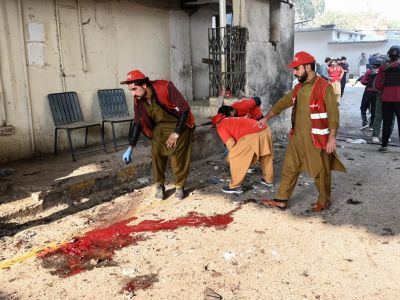Jordan's King Abdullah has urged Israel and the Palestinians to go back to the negotiating table to end nearly 11 months of bloodshed, and is backing international monitors as the best hope for peace.
Abdullah said in an interview on BBC radio that the conflict in the West Bank and Gaza Strip was a Pandora's box for the entire Middle East region.
"There is always the possibility that the violence could spill over from being an Israeli-Palestinian dispute and become a wider Israeli-Arab conflict," the monarch told the BBC, as cited by AFP.
But he admitted there was little chance the two sides would start talking without outside "help," and he backed an international monitoring force, despite the objections of Israel and little consensus on how it would function.
"Let's see if international observers can do something, because there's nothing else to go for," he said.
The leading Group of Eight (G-8) industrialized nations backed international observers to monitor a tattered US-brokered truce in the Occupied Territories at a meeting in July, but only if both sides agreed.
But President Hosni Mubarak of Egypt, which signed a peace treaty with Israel 15 years before Jordan, questioned whether an observer force would be able to guarantee a ceasefire in the Palestinian lands.
King Abdullah also said he understood Washington's reluctance to become involved in resolving the 11-month conflict while fighting rages, a position which has garnered it heavy criticism across the region.
US President George W. Bush has repeatedly said his administration would not get more involved until Israelis and Palestinians ended their violent clashes.
"The US is desperate to get involved," the king said.
"But until both sides can show maturity, the US feels it will be taken advantage of again. Both need to do more. The American presidential card is an important card. When he steps in, he must be 99.9 percent certain of success.
"You have to understand their point of view," he said, arguing that the Bush administration felt the Israelis and Palestinians were both able to play the former administration of Bill Clinton off against the other side.
President Bush blamed Palestinian President Yasser Arafat and the PA for the violence, urging him to work for a halt in the suicide bombings by Palestinian resistance fighters.
He also said Jordan was not contemplating breaking off its diplomatic ties with Israel despite calls by some Arab countries, and said he was not being pressured to do so by his country's large Palestinian population.
Even Arafat saw the open lines of communication as an asset in case of a crisis, Abdullah said.
"Arafat doesn't want it (the breaking of ties)," he said. "Who else would talk to the Israelis?"
The monarch added that, even if the conflict escalated, his country could not sustain a third influx of Palestinians, who already make up almost half of the five million-strong population.
"That's a red line for Jordan: we have made it clear to Washington, Israel and the Europeans," he said.
He said more refugees would both weaken the Palestinian call for an independent state, and be almost impossible for the small kingdom to handle.
“Physically we are limited by water," he said. "We could not sustain any more citizens."
Tens of thousands of Palestinians poured into Jordan after the creation of Israel in 1948, and again in June 1967 after the outbreak of another Arab-Israeli war during which Israel occupied the West Bank and east Jerusalem.
Meanwhile, King Abdullah will urge Russian President Vladimir Putin to play a more active role to revive the Middle East peace process and the Israeli-Palestinian talks during his visit to Moscow next week, said Prime Minister Ali Abul Ragheb on Thursday.
In an interview with AFP, cited by the official Petra news agency, Abul Ragheb said that there were important issues to be discussed by the monarch and President Putin, such as urging the Russians to play an active role in reviving the peace process, and building a strategy, in cooperation with Europe and the US, to resume the Israeli-Palestinian negotiations.
"Russia gives more balance to the world powers in the Middle East," he added.
Asked if Jordan plans to buy Russian weapons, the premier said the issue was subject to discussion, but that no decisions had been made yet regarding arms deals or military cooperation.
King Abdullah is due in Hungary this weekend - Albawaba.com
© 2001 Al Bawaba (www.albawaba.com)









